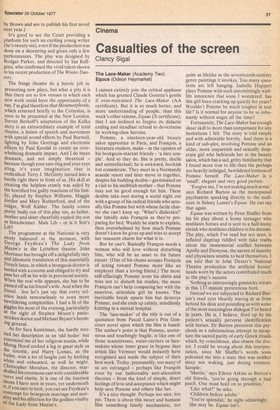Cinema
Casualties of the screen
Clancy Sigal
The Lace-Maker (Academy TWO) Equus (Odeon Haymarket) I cannot entirely join the critical applause which has greeted Claude Goretta's gentle if over-restrained The Lace-Maker (AA certificate). But it is so much better, and more understanding of people, than this week's other release, Equus (X certificate), that I am inclined to forgive its didactic ,ending and steadfast refusal to devictimise its working-class heroine.
Pomme, a nineteen-year-old beauty salon apprentice in Paris, and Francois, a literature student, make — in the opinion of his bourgeois-marxist friends — 'a nice couple'. And so they do. She is pretty, docile and unintellectual; he is awkward, bookish but considerate. They meet in a Normandy seaside resort and later move in together, despite his budding doubts — germinated on a visit to his snobbish mother — that Pomme may not be good enough for him. These doubts take root during a social night out with a group of his radical friends who actually like Pomme but with whose facile chatter she can't keep up. 'What's dialectics?' she timidly asks Francois as they're preparing for bed. Weakly he starts to explain, then overwhelmed by how much Pomme doesn't know he gives up and tries to accept her innocent charm for what it is.
But he can't. Basically Francois needs a woman who will love without disturbing him, who will be an asset to his future career. (One of his chums accuses Francois of acting toward Pomme more like an employer than a loving friend.) The more self-effacingly Pomme irons his shirts and tries not to disturb his studies, the more Francois can't help comparing her with the assertive, articulate girl he knows. The inevitable break upsets him but destroys Pomme, and she ends up calmly, mindlessly knitting in a mental hospital.
The lace-maker' of the title is out of a quotation from Pascal Laine's Prix Goncourt novel upon which the film is based. The author's point is that Pomme, anonymous and touchingly fragile, is like one of those seamstresses, water-carriers or lacemakers whose inner grace in bygone days artists like Vermeer would instantly have recognised and made the subject of their best work. Today, presume*, too many of us are estranged — perhaps like Francois even by our fashionably anti-alienation theories — from the kind of simple, direct feelings of love and acceptance which might help save Pomme and others like her.
It's a nice thought. Perhaps too nice, too pat. There is about this sweet and humane film something faintly mechanistic, not quite as lifelike as the seventeenth-century genre paintings it invokes. Too many questions are left hanging. Isabelle Huppert plays Pomme with such unremittingly waiflife innocence that soon I wondered: has this girl been cracking up quietly for years? Wouldn't Pomme be much tougher in real life? Is it normal for anyone to be so inhumanly without anger all the time?
Fortunately, The Lace-Maker has enough sheer skill to more than compensate for any hesitations I felt. The story is told simply and with admirable brevity. And there is a kind of sub-plot, involving Pomme and an older, more coquettish and sexually desperate girl who befriends her at the beauty salon, which has a sad, gritty familiarity that I found more true to life than the perhaps too heavily indulged, bewildered lostness of Pomme herself. The Lace-Maker is a 'small', elegant and very good picture.
'Forgive me, I'm not making much sense,' says Richard Burton as the menopausal psychiatrist speaking directly to the audience in Sidney Lumet's Equus. He can say that again.
Equus was written by Peter Shaffer from his hit play about a loony teenager who mutilates horses and is sent to a half-loony shrink who mutilates children in his dreams. The play, which I've read but not seen, is inflated claptrap riddled with fake truths about the immemorial conflict between Apollo and Dionysus, the nature of insanity and physicians unable to heal themselves. I am told that in John Dexter's National Theatre production the artificial horses' heads worn by the actors contributed much to the play's success.
Nothing so interestingly gimmicky occurs in this 137-minute pretentious bore.
Instead we are subjected to Richard Burton's mad eyes blearily staring at us from behind his desk and pounding us with some of the most meaningless dialogue I've heard in years. He is, I believe, fired up by his patient's sexually perverse identification with horses. Dr Burton perceives this psychosis as a subconscious attempt to recapture the sacred purity of early Greek rituals which, by coincidence, also obsess the doctor. I could be wrong about this interpretation, since Mr Shaffer's words soon poleaxed me into a state that was neither sleep nor waking, just dozing torment. Sample: 'Martin,' says Eileen Atkins as Burton's old friends, 'you're going through a bad patch. One must hold on to priorities.'
'Like what?' he asks.
'Children before adults.'
'You're splendid,' he sighs admiringly. She may be. Equus isn't.


































 Previous page
Previous page